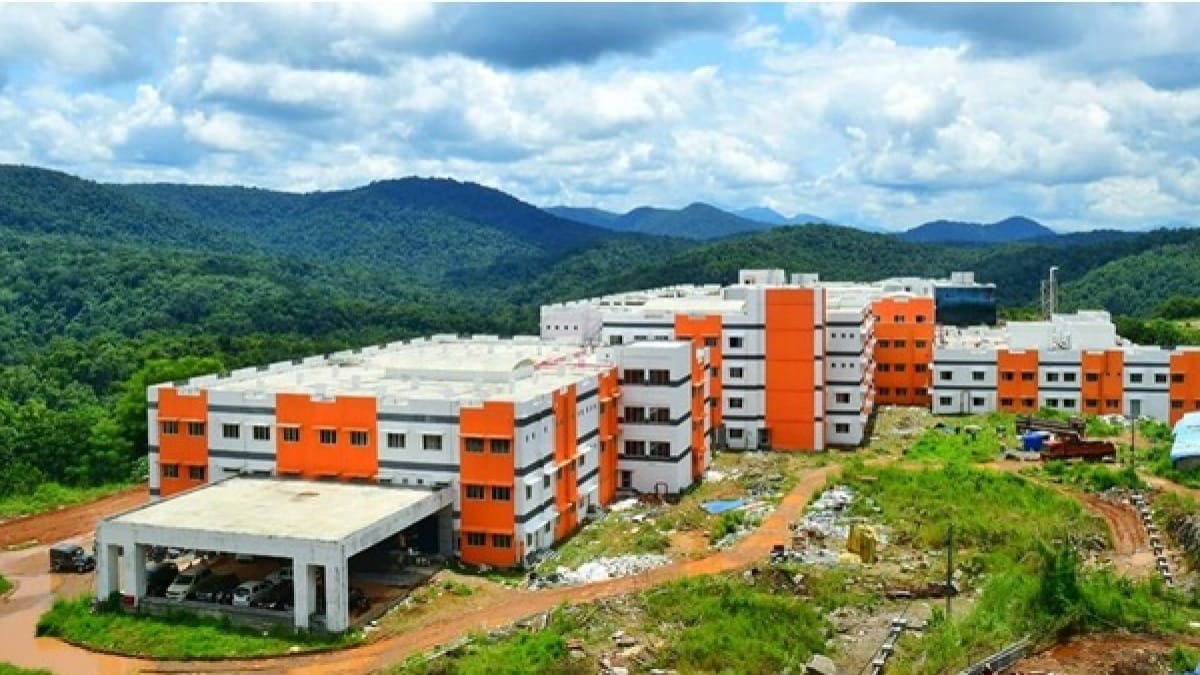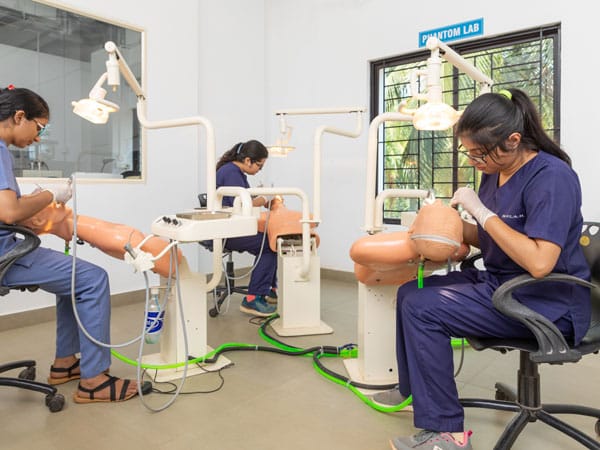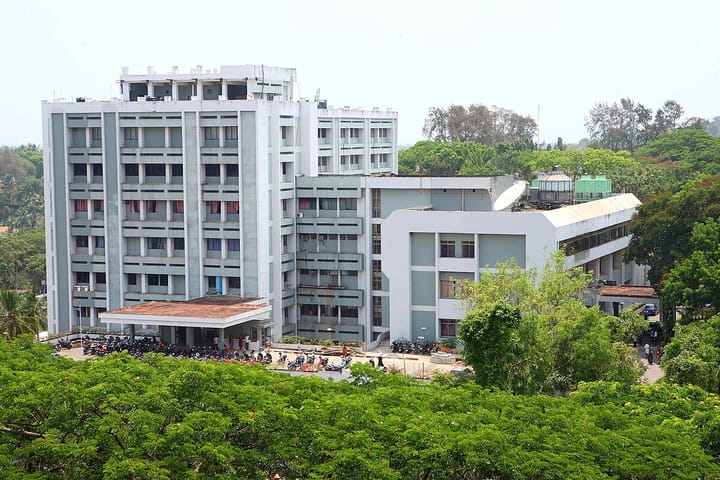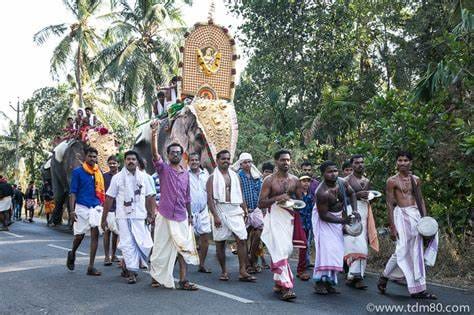Kerala Medical Colleges
Kerala's medical education system represents one of India's most successful models of healthcare human resource development. Kerala has a comprehensive ecosystem that combines government investment, private sector participation.

Kerala Medical Education: A Comprehensive Analysis of Medical Colleges, Ayurvedic Education, and Healthcare Excellence
Introduction
Kerala has emerged as one of India's premier destinations for medical education, combining traditional knowledge systems with modern medical science. The state's medical education infrastructure represents a remarkable blend of government initiatives, private enterprise, and academic excellence that has produced healthcare professionals serving not only India but the entire world. This comprehensive analysis examines Kerala's medical education landscape, from allopathic medical colleges to Ayurvedic institutions, exploring their impact on healthcare delivery, medical tourism, and the state's future as a medical education hub.
Overview of Medical Education in Kerala
Historical Development
Kerala's journey in medical education began in the 1950s with the establishment of the Government Medical College, Thiruvananthapuram, in 1951. This pioneering institution set the foundation for what would become one of India's most comprehensive medical education systems. The state's approach to medical education has always emphasized accessibility, quality, and integration of traditional and modern medicine.
The development of medical education in Kerala reflects the state's broader commitment to human development and social welfare. The government's investment in healthcare infrastructure, combined with private sector participation, has created a robust ecosystem that supports both undergraduate and postgraduate medical education.
Current Medical Education Landscape
Kerala's medical education system today encompasses a diverse array of institutions offering various medical programs. The state has successfully balanced government and private sector participation, ensuring both accessibility and quality in medical education. The integration of traditional systems like Ayurveda with modern allopathic medicine has created a unique educational environment that prepares healthcare professionals for diverse practice settings.
Allopathic Medical Colleges in Kerala
Government Medical Colleges
Kerala's government medical colleges form the backbone of the state's medical education system. The government medical colleges offer 1755 MBBS seats, distributed across 12 institutions throughout the state. These colleges are renowned for their academic excellence, affordable education, and commitment to serving the public healthcare system.
List of Government Medical Colleges:
- Government Medical College, Thiruvananthapuram (1951)
- The oldest and most prestigious medical college in Kerala
- MBBS seats: 150
- Postgraduate programs: 19 departments
- Affiliated hospital: 1,200 beds
- Special features: Advanced cardiac care, neurosurgery, oncology
- Government Medical College, Kozhikode (1957)
- Known for excellence in clinical training
- MBBS seats: 150
- Postgraduate programs: 18 departments
- Research focus: Tropical medicine, infectious diseases
- International collaborations for medical research
- Government Medical College, Kottayam (1965)
- Renowned for innovative teaching methods
- MBBS seats: 150
- Community health programs integration
- Rural health initiatives
- Telemedicine center
- Government Medical College, Thrissur (1982)
- Modern infrastructure and facilities
- MBBS seats: 150
- Advanced diagnostic facilities
- Research in preventive medicine
- Public health programs
- Sree Gokulam Medical College, Trivandrum (Government aided)
- MBBS seats: 150
- Modern medical education facilities
- Community health focus
- Government Medical College, Kannur (2008)
- Serves northern Kerala region
- MBBS seats: 100
- Growing postgraduate programs
- Rural health integration
- Government Medical College, Manjeri (2013)
- Newest addition to government medical colleges
- MBBS seats: 100
- Modern infrastructure
- Focus on rural healthcare
- Additional Government Medical Colleges:
- Government Medical College, Palakkad
- Government Medical College, Pariyaram
- Government Medical College, Kollam
- Government Medical College, Ernakulam
- Government Medical College, Alappuzha
Private Medical Colleges
The private medical colleges offer 2900 MBBS seats, distributed across 21 institutions. These colleges have significantly expanded medical education capacity and often feature state-of-the-art facilities and innovative teaching methodologies.
Notable Private Medical Colleges:
- Amrita Institute of Medical Sciences, Kochi
- MBBS seats: 100
- Internationally recognized institution
- Advanced research facilities
- Medical tourism hub
- Specialty programs in cardiology, neurology, oncology
- Jubilee Mission Medical College, Thrissur
- Annually admits 100 students for MBBS course and also runs 18 post graduate medical courses
- Strong clinical training programs
- Community health initiatives
- Medical research programs
- Pushpagiri Institute of Medical Sciences, Tiruvalla
- MBBS seats: 150
- Comprehensive medical programs
- Research in tropical diseases
- International student programs
- Believers Church Medical College, Tiruvalla
- MBBS seats: 100
- Modern medical education
- Rural health focus
- Affordable private education
- Additional Private Medical Colleges:
- Academic Medical Centre, Pariyaram
- Azeezia Institute of Medical Sciences, Kollam
- Caritas Medical College, Kottayam
- DM WIMS Medical College, Wayanad
- Govt. T.D. Medical College, Alappuzha
- Indira Gandhi Medical College, Kadakkal
- Karuna Medical College, Chittur
- Kerala Institute of Medical Sciences, Thiruvananthapuram
- Malankara Orthodox Syrian Church Medical College, Kolenchery
- MES Medical College, Perinthalmanna
- Muthoot Institute of Technology and Science, Ernakulam
- Nitte (Deemed to be University), Mangalore - Kochi Campus
- Noorul Islam Centre for Higher Education, Kumaracoil
- PK Das Institute of Medical Sciences, Vaniamkulam
- Pondicherry Institute of Medical Sciences - Karaikal
- Sree Narayana Institute of Medical Sciences, Ernakulam
- Travancore Medical College, Kollam
Seat Distribution and Admission Process
Kerala NEET counselling 2024 will allocate a total of 3,182 MBBS and 2,077 BDS seats. The admission process follows the National Eligibility cum Entrance Test (NEET) pattern, with seats distributed through:
Seat Categories:
- 15% All India Quota seats
- 85% State Quota seats
- Management quota seats in private colleges
- NRI/NRI-sponsored seats
Reservation Policy:
- Scheduled Castes: 8%
- Scheduled Tribes: 2%
- Other Backward Classes: 27%
- Economically Weaker Sections: 10%
- Persons with Disabilities: 5%
Ayurvedic Medical Education in Kerala
Historical Significance of Ayurveda in Kerala
Kerala has been a traditional center of Ayurvedic learning for centuries. The state's unique geographical features, abundant medicinal plants, and traditional knowledge systems have made it a natural hub for Ayurvedic education and practice. The integration of traditional Ayurvedic knowledge with modern medical education has created a distinctive approach to healthcare education.
Ayurvedic Medical Colleges
Kerala houses several prestigious Ayurvedic medical colleges offering Bachelor of Ayurvedic Medicine and Surgery (BAMS) programs. Kerala University of Health Sciences is among the recognized institutions offering BAMS courses.
Government Ayurvedic Medical Colleges:
- Government Ayurveda College, Thiruvananthapuram (1889)
- India's first Ayurveda college
- BAMS seats: 60
- Postgraduate programs: MD (Ayurveda) in 8 specialties
- Research in traditional medicine
- Medicinal plant conservation
- Government Ayurveda College, Kannur
- BAMS seats: 50
- Traditional medicine research
- Clinical training programs
- Community health integration
Private Ayurvedic Medical Colleges:
- Amrita School of Ayurveda, Kollam
- Part of Amrita Vishwa Vidyapeetham
- BAMS seats: 60
- Modern infrastructure
- Research in Ayurvedic pharmacology
- International collaborations
- Vaidyaratnam Ayurveda College, Ollur
- BAMS seats: 60
- Traditional teaching methods
- Clinical training
- Medicinal plant cultivation
- SDM College of Ayurveda and Hospital, Kuthpady
- BAMS seats: 60
- Comprehensive Ayurvedic education
- Research programs
- Clinical excellence
- Additional Ayurvedic Colleges:
- Pankajakasthuri Ayurveda Medical College, Kattakkada
- Rajah Muthiah Ayurveda College, Annamalainagar
- Kerala Ayurveda Academy, Aluva
- Coimbatore Ayurveda Medical College
- Various affiliated colleges under Kerala University of Health Sciences
BAMS Course Structure and Curriculum
The BAMS program in Kerala follows a comprehensive curriculum that includes:
Duration: 5.5 years (4.5 years academic + 1 year internship)
Core Subjects:
- Sanskrit and Ayurveda Siddhanta
- Rachana Sharir (Anatomy)
- Kriya Sharir (Physiology)
- Dravyaguna Vigyan (Pharmacology)
- Rasa Shastra (Pharmacy)
- Roga Nidana (Pathology)
- Charaka Samhita and Sushruta Samhita
- Kaumarbhritya (Pediatrics)
- Shalya Tantra (Surgery)
- Shalakya Tantra (ENT and Ophthalmology)
- Kayachikitsa (Internal Medicine)
- Prasuti Tantra (Obstetrics and Gynecology)
- Agada Tantra (Toxicology)
- Swasthavritta (Preventive and Social Medicine)
Modern Medical Subjects:
- Anatomy and Physiology
- Pathology and Microbiology
- Pharmacology
- Forensic Medicine
- Community Medicine
- Emergency Medicine
District-wise Distribution of Medical Education
Thiruvananthapuram District
Medical Colleges: 4 (2 Government, 2 Private) Total MBBS Seats: 450 Ayurvedic Colleges: 3 Total BAMS Seats: 180
Notable Institutions:
- Government Medical College, Thiruvananthapuram
- Government Ayurveda College, Thiruvananthapuram
- Sree Gokulam Medical College
- Kerala Institute of Medical Sciences
Ernakulam District
Medical Colleges: 3 (1 Government, 2 Private) Total MBBS Seats: 350 Ayurvedic Colleges: 2 Total BAMS Seats: 120
Notable Institutions:
- Government Medical College, Ernakulam
- Amrita Institute of Medical Sciences, Kochi
- Sree Narayana Institute of Medical Sciences
Thrissur District
Medical Colleges: 3 (1 Government, 2 Private) Total MBBS Seats: 350 Ayurvedic Colleges: 2 Total BAMS Seats: 120
Notable Institutions:
- Government Medical College, Thrissur
- Jubilee Mission Medical College
- Karuna Medical College, Chittur
Kozhikode District
Medical Colleges: 2 (1 Government, 1 Private) Total MBBS Seats: 250 Ayurvedic Colleges: 1 Total BAMS Seats: 60
Notable Institutions:
- Government Medical College, Kozhikode
- Private medical college affiliations
Other Districts
Kottayam District:
- Government Medical College, Kottayam (150 seats)
- Pushpagiri Institute of Medical Sciences (150 seats)
- Caritas Medical College
Kannur District:
- Government Medical College, Kannur (100 seats)
- Government Ayurveda College, Kannur
Kollam District:
- Azeezia Institute of Medical Sciences
- Travancore Medical College
Palakkad District:
- Government Medical College, Palakkad
Malappuram District:
- Government Medical College, Manjeri
- MES Medical College, Perinthalmanna
Wayanad District:
- DM WIMS Medical College
Alappuzha District:
- Government Medical College, Alappuzha
Student Enrollment and Graduation Statistics
Annual Intake and Enrollment
MBBS Programs:
- Government colleges: 1,755 students annually
- Private colleges: 2,900 students annually
- Total annual intake: 4,655 MBBS students
BAMS Programs:
- Government colleges: 110 students annually
- Private colleges: 480 students annually
- Total annual intake: 590 BAMS students
Postgraduate Medical Education:
- MD/MS seats: Approximately 800 annually
- Super-specialty (DM/MCh) seats: Approximately 150 annually
- Ayurveda postgraduate (MD Ayurveda): 120 annually
Graduation and Workforce Addition
Annual Medical Graduates:
- MBBS graduates: ~4,200 (accounting for dropouts and delays)
- BAMS graduates: ~550
- Postgraduate specialists: ~750
- Super-specialists: ~140
Cumulative Medical Workforce:
- Estimated registered doctors in Kerala: 45,000+
- Active practicing doctors: 35,000+
- Doctors per 10,000 population: 42 (national average: 10)
Grading and Quality Assessment of Kerala Medical Education
National Assessment and Accreditation
Medical Council of India (MCI) / National Medical Commission (NMC) Recognition:
- All medical colleges in Kerala are recognized by NMC
- Regular inspections ensure compliance with prescribed standards
- Most colleges maintain required faculty-student ratios
National Institutional Ranking Framework (NIRF) Rankings:
- Amrita Institute of Medical Sciences: Ranked among top 10 medical colleges in India
- Government Medical College, Thiruvananthapuram: Ranked among top 20
- Several other Kerala medical colleges feature in top 100 rankings
Quality Indicators
Faculty Qualifications:
- Faculty-student ratio: 1:10 (government colleges), 1:12 (private colleges)
- Percentage of PhD holders: 60%+ in government colleges
- Regular faculty development programs
- International exposure and training
Infrastructure Quality:
- Hospital bed capacity: 200-1,200 beds per medical college
- Modern diagnostic facilities
- Well-equipped laboratories
- Digital learning resources
- Research facilities
Research Output:
- Publications in indexed journals
- Research grants from national agencies
- Collaborative research projects
- Innovation and patent development
Clinical Training Quality:
- Diverse patient population for clinical exposure
- Adequate number of clinical cases
- Structured clinical training programs
- Simulation-based learning facilities
International Recognition
Global Accreditation:
- Some Kerala medical colleges recognized by international bodies
- Medical Council of Canada recognition for select programs
- World Health Organization recognition
- Education Commission for Foreign Medical Graduates (ECFMG) recognition
International Student Programs:
- Foreign student quotas in private colleges
- Exchange programs with international universities
- International clinical rotations
- Research collaborations with global institutions
New Medical Colleges and Future Expansion
Recent Additions and Approvals
Government Sector Expansion:
- Government Medical College, Manjeri (established 2013)
- Proposed new government medical colleges in underserved districts
- Capacity enhancement in existing colleges
- Super-specialty program additions
Private Sector Growth:
- New private medical college approvals
- Expansion of existing college capacities
- Introduction of new programs and specialties
- International collaboration programs
Planned Developments (2025-2030)
Infrastructure Development:
- Modernization of existing facilities
- Construction of new hospital complexes
- Advanced research laboratories
- Digital infrastructure enhancement
Program Diversification:
- Introduction of new medical specialties
- Integrated medical programs
- International standard curricula
- Technology-enhanced learning programs
Capacity Enhancement:
- Proposed increase in MBBS seats by 25%
- Expansion of postgraduate programs
- New super-specialty programs
- Research fellowship programs
Medical Education Quality and Standards
Curriculum and Teaching Methods
Modern Medical Education Approaches:
- Problem-based learning (PBL)
- Case-based learning
- Simulation-based medical education
- Technology-enhanced learning
- Early clinical exposure programs
Integration of Systems:
- Allopathic-Ayurvedic integration programs
- Modern diagnostic techniques in traditional medicine
- Evidence-based traditional medicine research
- Integrated clinical practice approaches
Assessment Methods:
- Continuous assessment programs
- Objective Structured Clinical Examinations (OSCE)
- Competency-based evaluation
- Portfolio-based assessment
- Research project requirements
Faculty Development and Training
Continuing Medical Education:
- Regular CME programs for faculty
- International conference participation
- Research methodology training
- Technology adoption programs
- Leadership development initiatives
Research and Innovation:
- Faculty research support programs
- Innovation and entrepreneurship development
- Collaborative research initiatives
- Patent and intellectual property development
- Industry-academia partnerships
Medical Tourism and its Impact on Medical Education
Kerala as a Medical Tourism Destination
Kerala has emerged as a premier medical tourism destination, significantly impacting medical education:
Medical Tourism Statistics:
- Annual medical tourist arrivals: 500,000+
- Medical tourism revenue: ₹2,000+ crores annually
- Growth rate: 15-20% annually
- International patient satisfaction rates: 95%+
Specialties Attracting Medical Tourists:
- Cardiac surgery and interventions
- Orthopedic procedures and joint replacements
- Neurosurgery and neurological treatments
- Oncology and cancer treatments
- Ayurvedic treatments and wellness programs
- Cosmetic and reconstructive surgery
- Fertility treatments and reproductive medicine
Impact on Medical Education
Enhanced Clinical Training:
- Exposure to diverse international cases
- High-volume, complex procedures
- International treatment protocols
- Quality assurance requirements
- Advanced technology utilization
Research Opportunities:
- Comparative treatment effectiveness studies
- International collaboration in research
- Access to latest medical technologies
- Publication in international journals
- Evidence-based practice development
Infrastructure Development:
- State-of-the-art medical facilities
- Advanced diagnostic equipment
- International standard protocols
- Quality certification requirements
- Continuous improvement programs
Doctor-to-Patient Ratio and Healthcare Accessibility
Current Doctor-Patient Ratios
Kerala maintains exceptional doctor-patient ratios compared to national and international standards:
Current Statistics:
- Doctors per 10,000 population: 42
- National average: 10 per 10,000
- WHO recommended ratio: 23 per 10,000
- Specialist doctors per 10,000: 18
- Rural doctor availability: 1:1,200 (significantly better than national average)
Distribution Analysis:
- Urban areas: 1:300 doctor-patient ratio
- Semi-urban areas: 1:500 doctor-patient ratio
- Rural areas: 1:800 doctor-patient ratio
- Specialist availability: Better than most Indian states
Healthcare Accessibility
Primary Healthcare:
- Primary Health Centers: 1,200+
- Community Health Centers: 180+
- Sub-centers: 5,500+
- Mobile health units: 150+
- Telemedicine centers: 100+
Secondary and Tertiary Care:
- District hospitals: 14
- Medical college hospitals: 33
- Specialty hospitals: 200+
- Private hospitals: 2,000+
- Total hospital beds: 85,000+
Emergency Healthcare:
- 24/7 emergency services availability
- Ambulance services coverage
- Trauma care centers
- Cardiac emergency networks
- Stroke care programs
Affordability and Financial Accessibility
Government Medical Education Costs
MBBS in Government Colleges:
- Annual tuition fees: ₹25,000-₹35,000
- Total course cost: ₹1.5-₹2.0 lakh
- Hostel and accommodation: ₹15,000-₹25,000 annually
- Additional costs (books, materials): ₹20,000-₹30,000 annually
Financial Support Systems:
- Merit scholarships for economically disadvantaged students
- Educational loans with subsidized interest rates
- Fee waivers for SC/ST/OBC students
- State government financial assistance programs
- Central government scholarship schemes
Private Medical Education Costs
MBBS in Private Colleges:
- Annual tuition fees: ₹8-₹25 lakh
- Total course cost: ₹40-₹1.25 crore
- Management quota fees: Higher premium
- NRI quota fees: USD 50,000-₹1.5 crore
Affordability Measures:
- Educational loan facilities
- Installment payment options
- Merit-based fee concessions
- Corporate sponsorship programs
- Alumni support initiatives
Healthcare Service Affordability
Government Healthcare:
- Free basic healthcare services
- Subsidized specialty treatments
- Insurance coverage programs
- Medicine availability programs
- Emergency treatment guarantees
Insurance and Financial Protection:
- Comprehensive Health Insurance Scheme (CHIS)
- Karunya Health Scheme
- Rashtriya Swasthya Bima Yojana (RSBY)
- Ayushman Bharat coverage
- Private health insurance penetration
Future of Kerala Medical Education and Healthcare
Technological Integration and Innovation
Digital Health Revolution:
- Telemedicine expansion programs
- AI-powered diagnostic tools
- Electronic health records implementation
- Mobile health applications
- Remote monitoring systems
Medical Education Technology:
- Virtual reality-based training
- Augmented reality clinical simulations
- AI-powered learning platforms
- Online medical education programs
- Digital assessment tools
Research and Development:
- Biotechnology research centers
- Pharmaceutical research facilities
- Medical device development
- Traditional medicine research
- Personalized medicine initiatives
Emerging Challenges and Opportunities
Demographic Challenges:
- Aging population healthcare needs
- Chronic disease management
- Mental health service requirements
- Geriatric care specialization
- Preventive healthcare emphasis
Workforce Challenges:
- Medical professional retention
- Rural healthcare staffing
- Specialty-specific shortages
- International migration impacts
- Continuing education requirements
Opportunities for Growth:
- Medical tourism expansion
- International medical education programs
- Research and innovation hubs
- Healthcare technology development
- Traditional medicine modernization
Strategic Initiatives for Future Development
Government Policy Initiatives:
- Kerala Health Policy 2030
- Medical Education Enhancement Program
- Healthcare Infrastructure Development
- Research and Innovation Promotion
- International Collaboration Framework
Private Sector Participation:
- Public-private partnerships in healthcare
- Corporate social responsibility in medical education
- Healthcare technology investments
- Medical infrastructure development
- Quality improvement initiatives
International Collaborations:
- Medical education exchange programs
- Research collaboration agreements
- Healthcare technology transfer
- International quality accreditation
- Global health initiative participation
Recommendations for Sustained Excellence
Medical Education Enhancement
Quality Improvement Measures:
- Regular curriculum updates
- Faculty development programs
- Infrastructure modernization
- Technology integration
- Assessment method improvements
Research and Innovation Promotion:
- Increased research funding
- Industry-academia collaborations
- Innovation incubation centers
- Patent and intellectual property support
- International research partnerships
Accessibility and Equity:
- Affordable education programs
- Rural and underserved area focus
- Minority and disadvantaged group support
- Financial assistance expansion
- Merit-based opportunity creation
Healthcare System Strengthening
Service Delivery Improvements:
- Primary healthcare strengthening
- Specialty service expansion
- Emergency care enhancement
- Preventive healthcare emphasis
- Quality assurance programs
Technology and Innovation:
- Digital health system implementation
- Telemedicine network expansion
- AI and machine learning integration
- Mobile health service development
- Data analytics and health informatics
Human Resource Development:
- Medical professional retention strategies
- Continuing education programs
- Skill development initiatives
- Career advancement opportunities
- Work-life balance improvements
Conclusion
Kerala's medical education system represents one of India's most successful models of healthcare human resource development. The state has created a comprehensive ecosystem that combines government investment, private sector participation, and cultural emphasis on education to produce high-quality healthcare professionals. The integration of traditional Ayurvedic knowledge with modern medical science has created a unique educational environment that serves both local and global healthcare needs.
The remarkable doctor-to-patient ratio, quality of medical education, and healthcare accessibility achievements position Kerala as a leader in medical education and healthcare delivery. However, the state faces challenges including medical professional migration, emerging health challenges, and the need for continuous adaptation to technological advances.
The future of Kerala's medical education lies in its ability to maintain quality while expanding access, integrate traditional and modern knowledge systems, embrace technological innovations, and address emerging healthcare challenges. The state's strong foundation in medical education, combined with strategic planning and continued investment, positions it well to continue serving as a model for medical education excellence in India and beyond.
Kerala's journey in medical education demonstrates that with proper planning, investment, and commitment to quality, it is possible to create world-class medical education systems that serve both local needs and global healthcare requirements. The state's experience offers valuable lessons for other regions seeking to develop comprehensive medical education and healthcare systems.



